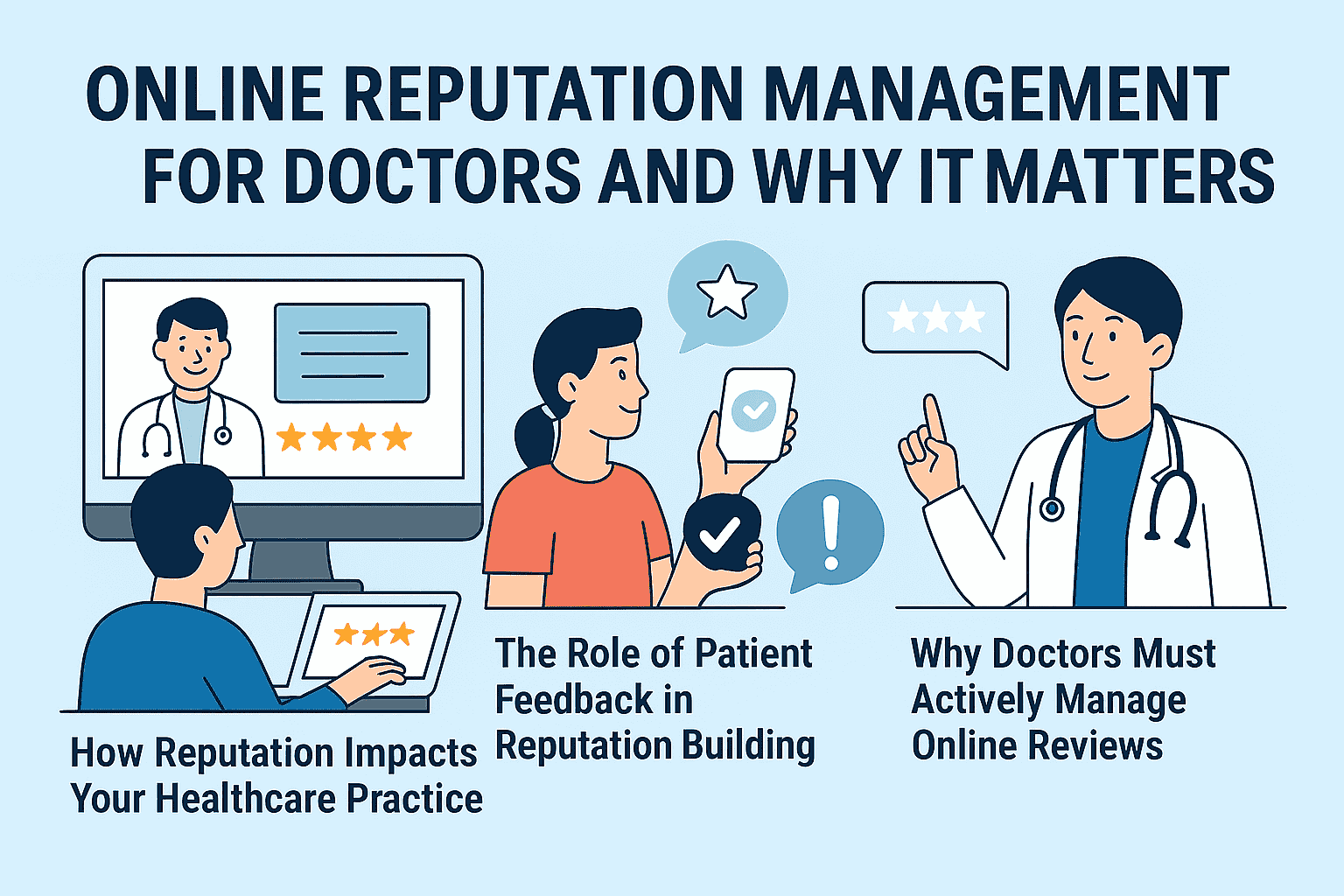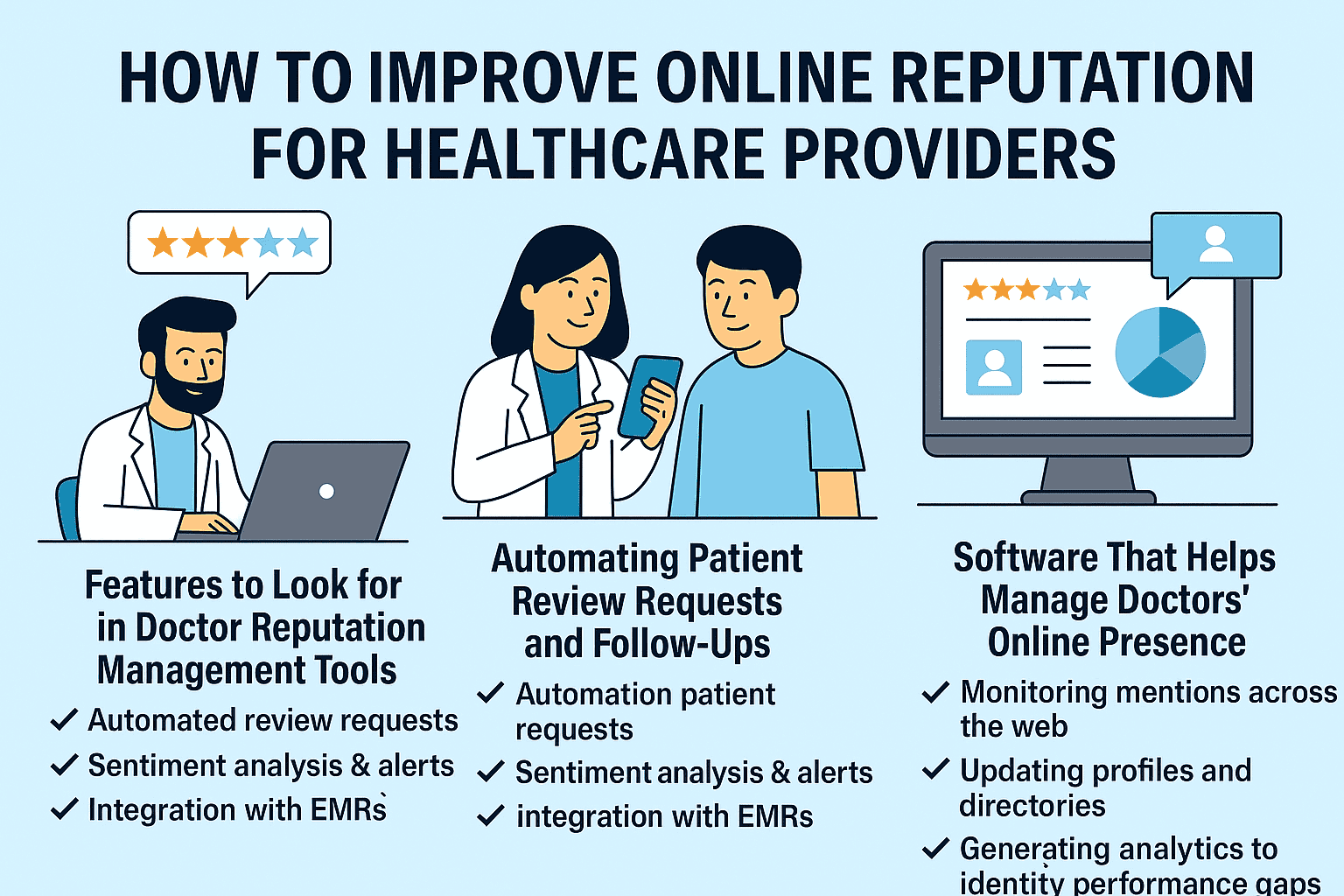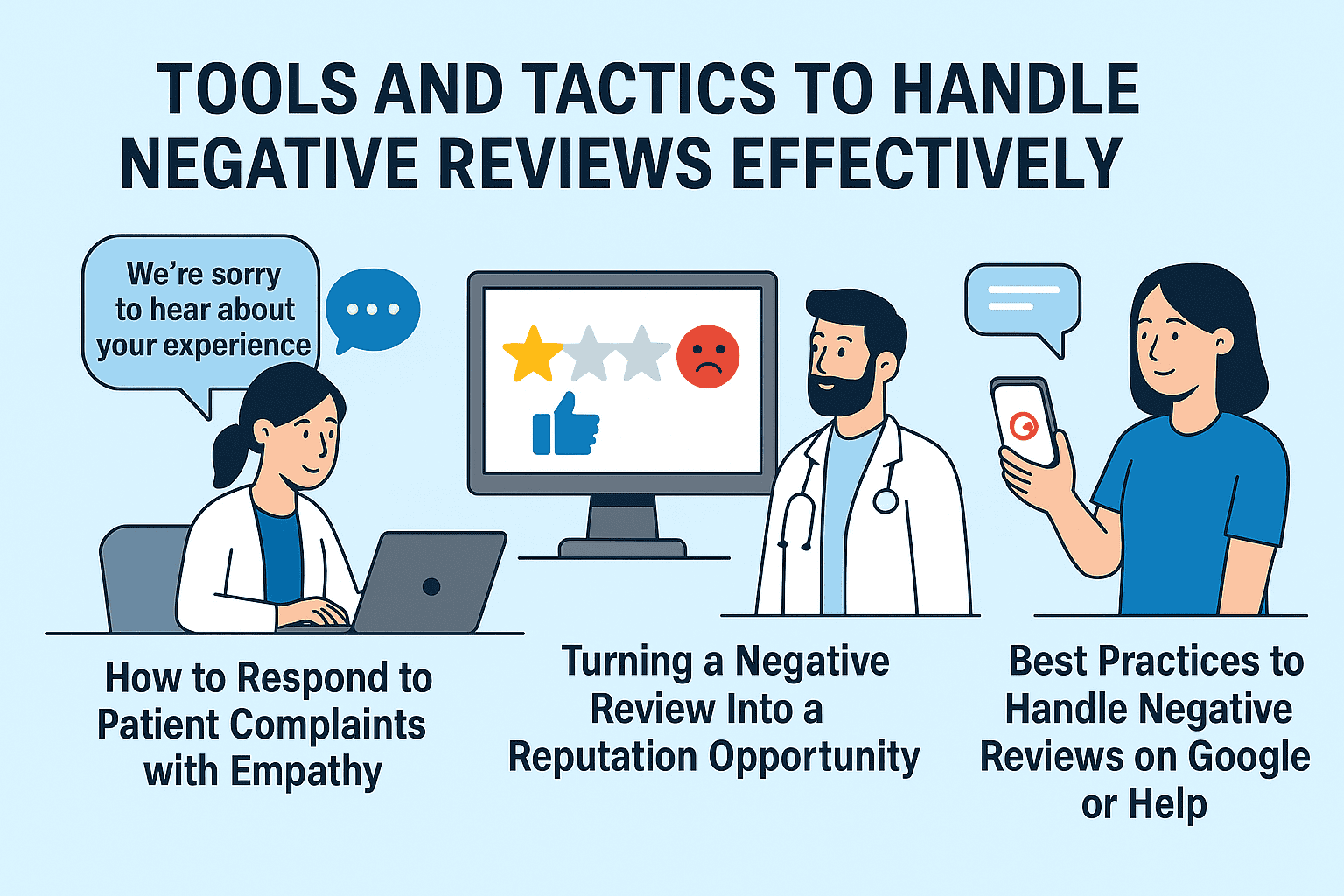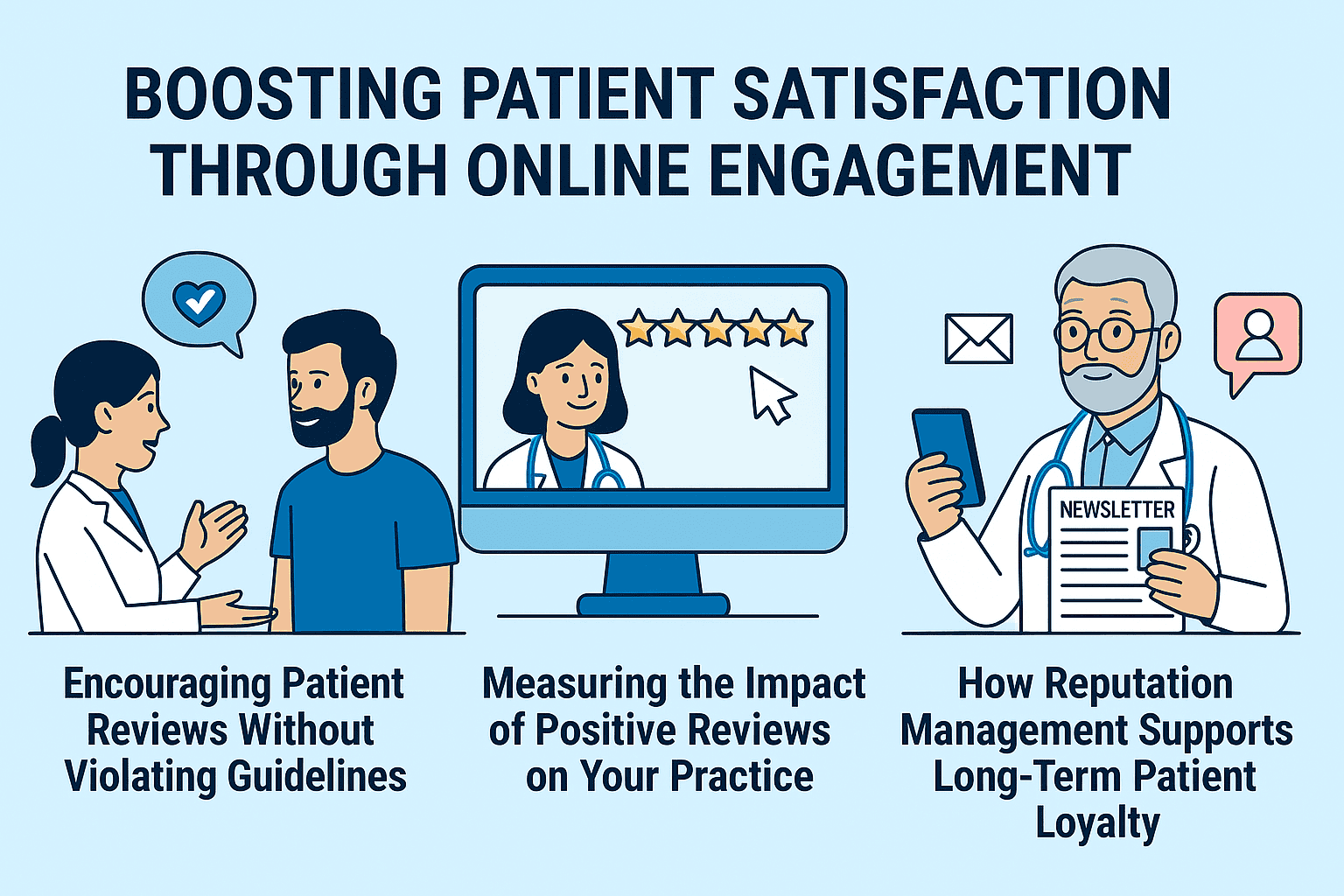
In today’s digital-first world, a doctor’s reputation extends far beyond word of mouth. Prospective patients turn to Google, Help, Healthgrades, and other online review platforms to decide which healthcare provider to trust. That’s why online reputation management for doctors has become a mission-critical aspect of running a successful practice. Prospective patients turn to Google, Help, Healthgrades, and other online review platforms to decide which healthcare provider to trust. That’s why online reputation management for doctors has become a mission-critical aspect of running a successful practice.
This comprehensive guide explores how healthcare professionals can protect, monitor, and enhance their online reputations, improve patient satisfaction, and generate more positive reviews that build lasting trust.
Table of Contents
Toggle- Why Online Reputation Management for Doctors Is Essential
- How to Improve Online Reputation for Healthcare Providers
- Tools and Tactics to Handle Negative Reviews Effectively
- Online Reputation Management Software for Doctors
- Boosting Patient Satisfaction Through Online Engagement
- Conclusion: Managing Doctors’ Online Reputations with Confidence
Why Online Reputation Management for Doctors Is Essential
A single negative review can significantly impact public perception, whereas a consistent stream of positive feedback helps build credibility and foster patient confidence.

How Reputation Impacts Your Healthcare Practice
Your online reputation isn’t just about vanity—it directly impacts your bottom line. A 2024 study found that 84% of patients trust online reviews as much as personal recommendations when choosing a healthcare provider.
Doctors with strong online reputations tend to:
- Attract more patients organically
- Receive higher appointment bookings
- Enjoy increased word-of-mouth referrals
- Maintain trust through visibility and transparency
The Role of Patient Feedback in Reputation Building
Patient reviews help others understand the experience at your clinic. From bedside manner and wait times to staff friendliness and follow-up care, patient feedback plays a vital role in shaping perception.
Encouraging positive online reviews and responding professionally to negative reviews demonstrates a commitment to patient care and helps influence undecided prospects.
Why Doctors Must Actively Manage Online Reviews
Ignoring your reviews is risky. Even one unaddressed complaint can harm your image. Reputation management for doctors involves monitoring, engaging, and taking corrective action to ensure your online presence reflects the high-quality care you deliver. Even one unaddressed complaint can harm your image. Reputation management for doctors involves monitoring, engaging, and taking corrective action to ensure your online presence reflects the high-quality care you deliver.
How to Improve Online Reputation for Healthcare Providers
A proactive reputation management strategy enhances visibility, patient loyalty, and search engine rankings.

Strategies to Get More Positive Online Reviews
- Ask happy patients for reviews: Right after a successful visit, ask for feedback while the experience is fresh.
- Use automated review requests: Tools can send SMS or email reminders linked to your Google or help profiles.
- Display QR codes: Let patients scan and leave a review on the spot.
Leveraging Google Reviews and Help for Growth
Google Reviews affect your practice’s local SEO. Having a high rating boosts your visibility on maps and search listings. Help, while stricter in its filtering, is also crucial for new patient acquisition. To maximize performance, pair your review strategy with medical website design and healthcare PPC advertising to drive traffic and trust. Having a high rating boosts your visibility on maps and search listings. Help, while stricter in its filtering, is also crucial for new patient acquisition.
Keep profiles updated with accurate contact information, services, and professional photos. Actively responding to reviews on these platforms signals engagement.
Reputation Management Helps Your Practice Stand Out
With the competitive nature of private practice, your reviews can be the deciding factor. Standout practices often:
- Prioritize bedside manner
- Make communication easy
- Follow up with patients post-visit
Highlight these strengths in your review responses to build a clear value proposition.
Tools and Tactics to Handle Negative Reviews Effectively
Negative feedback is inevitable. How you respond can either damage or strengthen your reputation.

How to Respond to Patient Complaints with Empathy
Always acknowledge the patient’s concern first: “We’re sorry to hear about your experience. We take your feedback seriously and want to make things right.”
Avoid being defensive. HIPAA compliance is essential—never reveal personal health information in your response.
Turning a Negative Review Into a Reputation Opportunity
Handled correctly, a negative review can demonstrate your professionalism and care. Publicly addressing it shows accountability. Privately resolving the issue can often lead to the reviewer updating or removing their complaint.
Best Practices to Handle Negative Reviews on Google or Help
- Respond promptly
- Stay professional
- Offer to resolve offline
Example: “We’d appreciate the chance to discuss this further. Please contact our office directly at [phone number] so we can address your concerns.”
Online Reputation Management Software for Doctors
Managing reviews manually is difficult at scale. Software solutions help streamline the process.
Features to Look for in Doctor Reputation Management Tools
- Automated review requests
- Sentiment analysis & alerts
- Integration with EMRs
- Multi-platform review tracking (Google, Yelp, Healthgrades, etc.)
Automating Patient Review Requests and Follow-Ups
Platforms like Podium, Birdeye, and Doctible allow doctors to automatically request reviews post-appointment and follow-up to ensure completion.
These tools also make it easy to:
- Send reminders via SMS or email
- Direct patients to preferred review sites
- Segment requests based on visit types
Software That Helps Manage Doctors’ Online Presence
Reputation management software also assists with
- Monitoring mentions across the web
- Updating profiles and directories
- Generating analytics to identify performance gaps
Boosting Patient Satisfaction Through Online Engagement
Satisfied patients leave positive reviews. Reputation management starts with exceptional service and ends with engagement.

Encouraging Patient Reviews Without Violating Guidelines
Always:
- Ask for feedback, not a specific star rating
- Avoid incentives (they violate most platform policies)
- Give patients a simple, one-click way to review
Measuring the Impact of Positive Reviews on Your Practice
Track:
- Increase in inbound appointment calls
- Search engine visibility improvements
- Referrals driven by review platforms
How Reputation Management Supports Long-Term Patient Loyalty
Consistent engagement through reviews, newsletters, and feedback forms builds loyalty. You can also leverage HIPAA-compliant email marketing to enhance follow-ups while protecting patient privacy. When patients feel heard, they stay longer and refer others.
Conclusion: Managing Doctors’ Online Reputations with Confidence
Doctors no longer have the luxury of ignoring their online image. In a world where trust begins with a Google search, mastering doctor reputation management is essential.
By focusing on online patient reviews, embracing reputation management software, and handling feedback professionally, healthcare providers can create a compelling digital presence that reflects the care they offer.
Start today. Own your reputation before someone else defines it for you.

We are an agency with over 12 years of experience in web design and development for small businesses. Our custom, responsive web solutions are backed by high ratings from numerous reviews, reflecting our commitment to quality. With a diverse portfolio that includes notable clients like Vodafone, we offer affordable and effective services to help small businesses enhance their online presence.
Categories:


